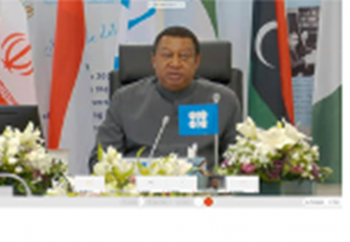
Thursday, September 24, 2020
Speech by OPEC Secretary General
Delivered by HE Mohammad Sanusi Barkindo, OPEC Secretary General, at the Second Workshop on Energy and Information Technology, 21 September 2020, via videoconference.
Distinguished guests, ladies and gentlemen,
It is a great pleasure to open this year’s Workshop on Energy and Information Technology. This is the second in what will hopefully be a continuing series.
We are very fortunate to have two outstanding moderators to guide our discussions, Dr Adnan A. Shihab-Eldin of the Kuwait Foundation for the Advancement of Sciences and OPEC colleague for many years; and Patrick von Pattay, Vice President for Digital Portfolio and Transformation at Wintershall Dea.
I would also like to extend a special welcome to our distinguished line-up of panellists and an impressive group of participants representing industry, government and research institutions.
Today’s event is a follow-up to the workshops we held last September over the course of two days and we were very encouraged by that inaugural workshop. We hope that this year’s combined videoconference provides a unique opportunity to examine timely developments in energy technology and innovation in greater detail with the participation of leading experts.
We have two sessions, the first focusing on blue hydrogen, and the second on Information Technology in the energy sector, including the topical issues of cyber security, digitalization and blockchain.
Bill Gates once said, “Innovation is the reason our lives have improved over the last century.”
I would like to expand upon these words of wisdom by noting that the oil industry, from its earliest days in the 19th century, has been a leader in developing and utilizing technologies to the benefit of global development and human progress. In the 21st century, technological innovation, coupled with an experienced and highly-skilled work force, are driving advances in the industry’s operations across the value chain and contribute to its ever-improving environmental performance.
The OPEC Secretariat is constantly reviewing and analyzing the latest technologies emerging in our industry with the support of our Member Countries and colleagues from the industry around the world.
Blue hydrogen is one of these many exciting developments and is the subject of our first panel discussion. Blue hydrogen, which is derived from hydrocarbons, offers the potential to add significant value to our industry by turning emissions into energy.
At this stage, blue hydrogen is being used on an industrial scale and has the most practical potential in the transport sector. Coupled with carbon capture and storage or utilization, blue hydrogen could provide an abundant, reliable and clean fuel in the future.
Blue hydrogen has the additional benefit of supporting the economic diversification goals of energy-exporting countries, such as ours, while strengthening their capacity to meet their own and the world’s growing energy needs.
Our second session focuses on Information Technology.
We will be examining a broad range of trends and breakthroughs, including big data, artificial intelligence and robotics. I am glad to see some of the leading companies in Europe in these fields joining us today. By capitalizing on their potential, we have the opportunity to achieve evolutionary advances in performance and risk management, as well as operational excellence.
We also hope today’s videoconference provides a platform for exploring other pivotal innovations. These include blockchain technology – which goes hand-in-hand with the exponential growth in data and industrial knowledge. New technologies also bring their own set of challenges. We will therefore explore cyber security and the ever-growing threat landscape we face.
As we explore these developments, dear colleagues, I would like to emphasize that there is an unbreakable link between transparent, accessible data and a secure, sustainable energy supply. In the oil industry, our production, planning and logistics systems would collapse without the technologies that facilitate timely and reliable data-collection.
At OPEC, we are continually strengthening our means and commitment to facilitate the flow of information through technology, and constant improvements in our direct communication with Member Countries and key energy stakeholders.
Furthermore, we recognize the pivotal importance of technology and innovation in addressing the pressing global challenges of energy poverty and climate change.
All of these technologies and innovations represent game-changing possibilities for the oil industry and energy sector in general. However, we must be cognizant that sustained investment is essential. Our industry needs access to capital to support the development and deployment of technologies that can help us achieve a stable, inclusive and sustainable energy future.
Distinguished colleagues,
The COVID-19 crisis has ushered in a digital era that has brought tremendous changes to our way of working. Without IT, none of us would be participating in this workshop. Despite social distancing and other measures to contain the pandemic, we have been conducting business as usual thanks to innovations in remote communications and operations.
I encourage all of us to share lessons learned over the past few months and present your view on tomorrow’s digital workplace.
In closing, I would like to point out that OPEC marked its 60th Anniversary only a week ago, on September 14th. The COVID-19 pandemic, which has caused unimaginable loss of life and economic disruption across the world, also forced us here in OPEC to postpone our anniversary celebrations.
Nonetheless, the miracles of technology allow us to carry on with decades of OPEC tradition in supporting dialogue, cooperation and the exchange of information to the benefit of producers, consumers and the global economy at large.
Our workshop is part of the OPEC Secretariat’s ongoing research programme, which holds workshops and technical meetings that act as a forum for discussion and the exchange of ideas on some of the energy industry’s most important issues. I would like to therefore acknowledge the work of my colleagues at the Secretariat in organizing today’s workshop under such challenging circumstances.
Thank you for participating.